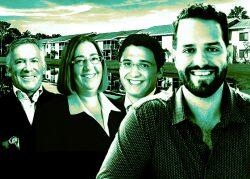If jobs don’t keep up with multifamily construction, Austin could be in trouble.
“It’s the worst housing market in the country really,” said Scott Everett, CEO of Dallas-based S2 Capital, on a recent podcast.
Aside from interest rate hikes, inventory is the biggest danger facing multifamily investing, he told Chris Powers of the Fort, in an interview that touched on his firm’s nine-figure investment funds, its view on distress and investing in artificial intelligence.
Rents remain on an upward curve in markets like Dallas-Fort Worth, where the region is adding about 100,000 jobs a year and developers can hardly keep up with demand. But cities that aren’t adding enough jobs or residents to match their incoming inventory could be facing a crisis. Austin adds more like 50,000 jobs a year, according to the Texas Workforce Commission.
The capital city has 80,000 to 100,000 apartment units under construction, Everett said.
“That would be a serious issue if you’re adding only 30,000 people, and that will crush rents,” Everett said.
The flip side of that is vulture capital. As rents drop and multifamily owners get underwater on their loans, opportunities arise for firms to find value-add assets, he said.
S2’s Multifamily Value-Add Fund I closed at $400 million in investor and co-invest commitments in February 2022. Fund II has yet to close, but Everett said it should end up somewhere between $700 and $800 million later this year.
That doesn’t necessarily mean S2 will be going on a multifamily spending spree anytime soon. The firm is looking for clarity on the economy and fed rates as it remains patient in deploying its fund.
“Everyone’s pitching this as rescue capital, but it’s not rescue capital. You’re replacing the equity at a basis that’s still elevated above what it’s worth,” Everett said. “I don’t think we’ll put out more than five to 10 percent of the fund by the end of this year. I just believe that the stress that’s been building in the system will start to show its cracks here and really become an opportunity heading into 2024.”
After being on a buying tear in recent years, Everett said, it’s been a challenge to convince his staff to slow down and wait for the market to present long-term opportunities.
“I think this next 10-year run for us could make the last 10-year run look paltry,” he said. “You have to weigh a lot of different measures in the fund business. If we can get our six, seven, $800 million platter, they know they will make a lot of money putting that to work over the next two years. They just have to be patient.”
In the meantime, S2 has been getting into other fields of investing, particularly AI. Firms that aren’t paying attention to AI will soon fall behind, he said.
“I won’t say too much, because we’re spending a lot of money on it and are very involved. But I think AI is like looking at the Internet the first time. I mean, it is mind blowing what you can accomplish,” he said. “It could theoretically replace all the jobs that require intelligence. What if you’re an attorney, and your job is knowing all this very difficult stuff that now AI can learn? What does that mean for tenants that are paying four grand a month that are attorneys? What does that mean for the demand? So we’re trying to figure out just what it all looks like.
“I don’t have great answers but we are spending a lot of time and money on just building out all the different data analytics.”
Everett started S2 in 2012 and quickly climbed the ranks in multifamily investment across Texas and the surrounding region. The firm has $7.5 billion of multifamily assets under management and is one of the most active multifamily investors in the country. The company focuses on Class B assets in the Sun Belt — primarily Texas, Florida, Georgia and the Carolinas. As of 2022, it had 4,455 units across 11 properties in North Texas alone.
Read more



